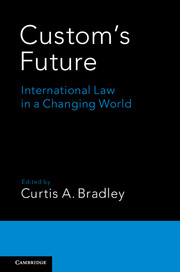Book contents
- Frontmatter
- Dedication
- Contents
- Notes on Contributors
- Introduction: Custom's Future
- 1 Custom's Past
- 2 Customary International Law Adjudication as Common Law Adjudication
- 3 Customary International Law as a Dynamic Process
- 4 Custom, Jus Cogens, and Human Rights
- 5 Customary International Law: How Do Courts Do It?
- 6 Custom's Method and Process: Lessons from Humanitarian Law
- 7 The Growing Obsolescence of Customary International Law
- 8 The Strange Vitality of Custom in the International Protection of Contracts, Property, and Commerce
- 9 The Decline of Customary International Law as a Source of International Criminal Law
- 10 Customary International Law and Public Goods
- 11 Reinvigorating Customary International Law
- 12 The Evolution of Codification: A Principal-Agent Theory of the International Law Commission's Influence
- 13 Custom and Informal International Lawmaking
- 14 Custom's Bright Future: The Continuing Importance of Customary International Law
- Bibliography
- Index
9 - The Decline of Customary International Law as a Source of International Criminal Law
Published online by Cambridge University Press: 05 February 2016
- Frontmatter
- Dedication
- Contents
- Notes on Contributors
- Introduction: Custom's Future
- 1 Custom's Past
- 2 Customary International Law Adjudication as Common Law Adjudication
- 3 Customary International Law as a Dynamic Process
- 4 Custom, Jus Cogens, and Human Rights
- 5 Customary International Law: How Do Courts Do It?
- 6 Custom's Method and Process: Lessons from Humanitarian Law
- 7 The Growing Obsolescence of Customary International Law
- 8 The Strange Vitality of Custom in the International Protection of Contracts, Property, and Commerce
- 9 The Decline of Customary International Law as a Source of International Criminal Law
- 10 Customary International Law and Public Goods
- 11 Reinvigorating Customary International Law
- 12 The Evolution of Codification: A Principal-Agent Theory of the International Law Commission's Influence
- 13 Custom and Informal International Lawmaking
- 14 Custom's Bright Future: The Continuing Importance of Customary International Law
- Bibliography
- Index
Summary
This chapter revisits customary international law (hereafter CIL) as a source of international criminal law (hereafter ICL) in the era of the International Criminal Court (hereafter ICC). Most contemporary reflections on the role of CIL in ICL and most observations regarding creative judicial identification processes still tend to zero in on the International Criminal Tribunal for the former Yugoslavia (hereafter ICTY). True, the 1990s were a decade-long experiment, or perhaps, indeed, an extended “Grotian Moment.” In any event, it was a period of accelerated, and at times artificial, CIL creation on a variety of ICL issues by the ad hoc tribunals. The ICTY's innovative methodologies nourished theories about the fragmentation of sources and ensuing claims regarding the existence of autonomized regimes. Being predominantly based on ICTY experiences, these claims may well have become outdated. The coming into operation of the ICC Statute has gradually engendered a new momentum that is best described as the “Codified Moment.” In this new ICC era, CIL plays a much less prominent role.
This chapter explores the decline of CIL in ICL. It begins by delimiting the concept of “international criminal law” and highlights some consequences of this delimitation for a discussion on the role of CIL. It argues that the essence of this area of law is its judicial application as part of a process to determine guilt of individuals and to impose a sentence. Hence, only judicial agents truly apply ICL, and they do so vis-a-vis individuals. By implication, ICL does not operate in a traditional interstate setting, a feature that also has consequences for CIL formation and identification.
The chapter then presents the causal claim that this decline is a direct consequence of the introduction of the ICC Statute and the move toward a universal and more consent-based regime. As will be demonstrated, the ICC Statute's design reflects the drafters’ explicit resolve to marginalize CIL. Subsequently, this chapter argues that the move away from CIL in ICL can itself be explained by the difficulties inherent in grounding rules of ICL in CIL. This normative claim is developed through an analysis of different types of rules, that is, procedural rules, substantive rules regarding the definition of crimes, and rules regarding modes of liability.
- Type
- Chapter
- Information
- Custom's FutureInternational Law in a Changing World, pp. 230 - 252Publisher: Cambridge University PressPrint publication year: 2016
- 2
- Cited by



